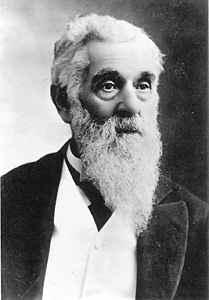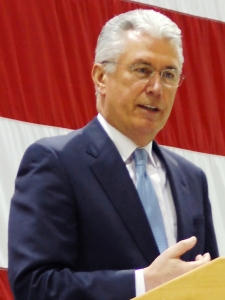Is it enough alone to know?
Reconciliation among different Mormon ideas of eternal progress Is it enough alone to know That we m...
Towards the end of Nephi’s teachings, he warns of a time where there will be ”churches which are built up, and not unto the Lord”:
And others will he pacify, and lull them away into carnal security, that they will say: All is well in Zion; yea, Zion prospereth, all is well—and thus the devil cheateth their souls, and leadeth them away carefully down to hell… Therefore, wo be unto him that is at ease in Zion! Wo be unto him that crieth: All is well!”
Earlier in the Book of Mormon Nephi points out how he “did liken all scriptures unto [them], that it might be for our profit and learning” (1 Nephi 19:23). Much of the power of scriptures comes when we see how its admonitions apply equally as well to us as it does to others. And here, this warning about attitudes we might have about Zion especially applies to our notions of church and the Kingdom of God. The Book of Mormon itself, interestingly, warns us against ultra-orthodox attitudes towards church and Zion.
A concern I have is that there have been times when I’ve seen Zion interpreted here as anything but the church, and failure to see how anything could be wrong with our church is evidence that we may be “cheating [our] souls” here. An ultra-orthodox narrative is precisely what this scripture is talking about here because an ultra-orthodox, hyper-devotional narrative cannot fathom how anything could be wrong with the church. It’s that perspective that insists, almost by definition, that “All is well in Zion”. Remember, this scripture is talking about “Zion”, us, the church. And if we cannot see how there could be any error in our church, then we squelch one of the foundational principles of the gospel: repentance. It is Satan here who advocates a view where the church can do no wrong — not God.
President Lorenzo Snow gave a healthy perspective in the April 1900 conference:

Lorenzo Snow
Seventy years ago this Church was organized with six members. We commenced, so to speak, as an infant. We had our prejudices to combat. Our ignorance troubled us in regard to what the Lord intended to do and what He wanted us to do. We advanced to boyhood, and still we undoubtedly made some mistakes, which generally arise from a lack of experience. We understand very well, when we reflect back upon our own lives, that we did many foolish things when we were boys. Yet as we advanced, the experience of the past materially assisted us to avoid such mistakes as we had made in our boyhood.It has been so with the Church. Our errors have generally arisen from a lack of comprehending what the Lord required of us to do. But now we are pretty well along to manhood. When we examine ourselves, however, we discover that we are still not doing exactly as we ought to do, notwithstanding all our experience. We discern that there are things which we fail to do that the Lord expects us to perform, some of which He requires us to do in our boyhood. While we congratulate ourselves in this direction, we certainly ought to feel that we have not yet arrived at perfection. There are many things for us to do yet.
I agree that “There are many things for us to do yet” as we maintain awareness of ”our prejudices” and “our ignorance” that would stop us from ”arriving at perfection”. And can we see how an ultra-orthodox approach to these problems is likely only to make them worse?

Dieter Uchtdorf (U.S. photo by Master Sgt. Burke Baker)
Fast forward 114 years and another LDS prophet, Elder Uchtdorf, asked the church this rhetorical question: “Are you sleeping through the Restoration?” (source). He quoted the 9th Article of Faith, emphasizing that there are “many great and important things” that “[God] will yet reveal.” God’s, and our own, work is not done and we should look at our current state not as the destination but merely as an imperfect step along the way towards greater knowledge and perfection. And in order for that to occur, we must acknowledge, repent of, and overcome “our prejudices” and “our ignorance” in the church that would stop us from ”arriving at perfection” and creating Zion. And this applies to every person who engages in the work — from top to bottom and in between. None are exempt from applying the scriptures.
Elder Uchtdorf goes on to emphasize the central role Christ plays in our avoiding these issues. He reminded us of the power of Christ’s words to “take up [our] cross, and follow him”, to “lose [our] life for his sake” (Mark 8:34–35), to “suffer [no evil] to enter into your heart” (3 Nephi 12:29), and to remember God’s two greatest commandments to “love the Lord thy God with all thy heart, and with all thy soul, and with all thy mind” and to “love thy neighbour as thyself” (Matthew 22:37–39). I believe that as we turn to Christ, avoid evils that would separate us from God (both personal and institutional), and put love above all else we will be able to overcome prejudice and ignorance that stands in our way in creating Zion.
Our challenge is to keep progressing in the grace of God through repentance both individually as well as a church. We must see how what we have now as a church is only enough to get us thus far and that we must look to God and continue forward in knowledge and revelation overcoming ignorance and prejudice to build Zion:
For behold, thus saith the Lord God: I will give unto the children of men line upon line, precept upon precept, here a little and there a little; and blessed are those who hearken unto my precepts, and lend an ear unto my counsel, for they shall learn wisdom; for unto him that receiveth I will give more; and from them that shall say, We have enough, from them shall be taken away even that which they have.
